From Miner to Trader: Perspectives on the Mineral Trade in Congo
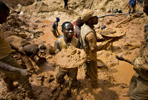
A BBC team in eastern Congo produced this stellar article, “From rebel-held Congo to beer can,” and podcast "Illegal Mining in Congo," both of which feature the perspectives of several key actors in eastern Congo’s profitable—and deadly—minerals trade. From an artisanal digger in a tin mine in South Kivu: We have to pay the rebels to work here…They force us to give them cash or the equivalent in minerals, he added, standing on the edge of his three-meter deep pit. And this (very likely false) statement from a colonel in the FLDR, a Rwandan Hutu militia responsible for some of ...
Letting the Window of Opportunity Slam Shut
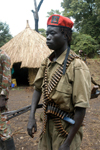
Via Resolve Uganda’s helpful Weekly Roundup, this news from Congo’s Orientale province, where the Lord’s Resistance Army, or LRA, has recently been wreaking havoc upon civilian populations in the Haut-Uele and Bas-Uele districts, near the border with southern Sudan: About 1,000 women marched quietly in the streets of Buta, over 300 km north of Kisangani, to protest against the violence perpetrated by the Lord's Resistance Army in Orientale Province and against the delays with which authorities have intervened to resolve the humanitarian issues and the growing insecurity in the region. (...) The march, which ended with a sit-in during which ...
Moyo at Cato: Putting an End to the “Pity Party”
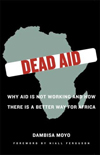
Last week, Dambisa Moyo addressed a packed auditorium at the Cato Institute in Washington, D.C., her latest stop in what the Center for Global Development’s Todd Moss (the discussant for Moyo’s lecture) called Moyo’s “media vortex.” If you have not yet heard of Dambisa Moyo, she is the author of Dead Aid: Why Aid is Not Working and How There is a Better Way For Africa, a book that (as the title suggests) sharply critiques the current foreign aid and development paradigm (Moyo might call it an “industry”) toward Africa. Paul Collier recently said that Moyo’s ideas “deserve to be ...
A Novel Idea for Protecting Civilians in Congo

In two recent articles for the Institute for War and Peace Reporting, Peter Eichenstadt suggests a fairly novel approach to addressing the growing threat of the Lord’s Resistance Army, or LRA, in northeastern Congo. But before I get to said idea, let's revisit the gravity of the LRA threat today. The LRA is responsible for more than 1,000 civilian deaths in northeastern Congo and southern Sudan since December 2008, when they began a ruthless “blowback” against the joint regional military operation conducted against them. See Human Rights Watch’s recent report on the LRA’s “Christmas Massacres” for detailed information on these ...
Re-supplying the LRA: Who Could it Be?
.jpg)
A recent BBC article raises some very interesting questions about the Lord's Resistance Army, or LRA, which is continuing its rampage against civilians in and around northeastern Congo's Garamba National Park in the aftermath of the recent joint military operation against it (known as Operation Lightning Thunder): How [does] the LRA manage to co-ordinate its ambushes when its forces are so dispersed? Where do they get the satellite phones they use - as well as the ammunition, food and medicines their forces require? The article notes that there have been a growing number of reports of alleged air-drops of food ...
You Tuned in Last Week, Now Take Action to Stop the LRA
SVU’s actors powerfully portrayed the devastating effects of the LRA on individuals. The episode detailed the plight of a Ugandan girl who had been a sex slave for an LRA commander in northern Uganda and a young Ugandan man reeling from the memories of the horrors he had committed as a child soldier. If you were compelled to action by what you saw, visit Enough’s special page on the LRA to learn more about how you can get involved to urge our leaders to take action to stop the LRA from committing further atrocities in central Africa. As SVU actress ...
(Hopefully not) Eternal Questions…
How can the international community protect civilians in conflict zones? When are United Nations peacekeepers useful in protecting civilians? And what are the key components of a U.N. peacekeeping mandate if such protection is to be achieved? These challenging questions have enormous bearing on conflict resolution efforts all over the world, from the Democratic Republic of the Congo to Sri Lanka. Entire institutions -- think the esteemed Stimson Center and its Future of Peace Operations program -- are devoted to wrestling with them. Other groups, such as the Ford Institute for Human Security, also work to address these core questions ...
Story of LRA Survivor Highlights Urgent Need for Increased Protection
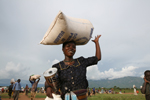
The Institute of War and Peace Reporting has released a harrowing account of a survivor of the violence of the Lord’s Resistance Army, or LRA. Catherine Ajok was abducted in 1996 by the LRA and became one of LRA commander Joseph Kony’s many “wives,” before finally escaping in December during the recent joint military operation on Kony’s camp in northeastern Congo’s remote Garamba National Park. This joint military offensive, known as Operation Lightning Thunder, was executed by the Ugandan, southern Sudanese, and Congolese militaries, but the operation failed in its goal to capture Kony and the senior leadership of the ...
Sudan’s Elections Postponed
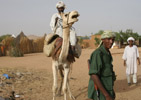
Yesterday, the deputy chairman of Sudan’s electoral commission, Abdullah Ahmed Abdullah announced that Sudan’s general elections (parliamentary and presidential) will be postponed until 2010. Abdullah told AFP, “The electoral process starts this April and will finish in February 2010.” Sudan last held elections in 1986, when the Umma party’s Sadiq al-Mehdi won; al-Medhi was overthrown by the current President Bashir in 1989 in a bloodless coup. Officials from both of the major Sudanese political parties welcomed the decision. President Bashir’s National Congress Party, or NCP, expressed confidence that the new schedule allows adequate time for “transparent elections” and international and ...


